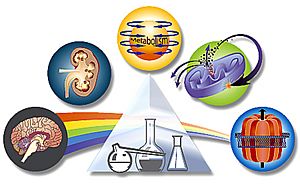Pharmacology facts for kids

Pharmacology is the study of how medicines and other substances affect living things. It explores how these substances change the way our bodies work. You could also say pharmacology is the study of how medicines actually do their job.
Pharmacology is not the same as pharmacy. Also, a pharmacologist is different from a pharmacist. A pharmacologist is a scientist who studies how medicines work. They usually do their research in a science lab. A pharmacist is a healthcare professional who typically works in a pharmacy, helping people get their medicines. However, these two fields are connected. Pharmacists learn a lot about pharmacology when they are in school.
Contents
What Do Pharmacologists Study?
If something can be used as a medicine, it is called a pharmaceutical. Pharmacology looks at many things about these substances. It studies how drugs are made, how they interact with living organisms, and what harmful effects they might have. Pharmacologists also learn how drugs can be used as medicines and if they can help prevent illnesses.
A person who works in this field is called a pharmacologist. Pharmacologists often work with other scientists. These include biochemists, geneticists, microbiologists, toxicologists, and pharmacists. Together, they run tests to see how drugs work in the body.
Why is Pharmacology Important?
Developing new medicines is very important for healthcare. It also has big impacts on the economy and even politics. To keep people safe and prevent the misuse of drugs, some countries control how medicines are made, sold, and given out.
How Drugs Affect the Body
To study chemicals, scientists need to know a lot about what happens when they enter the body. As we learn more about cell biology and biochemistry, the field of pharmacology keeps changing. Now, scientists can even design chemicals to do very specific things.
A chemical can have different effects. There are two main areas pharmacologists study:
- Pharmacokinetics describes what the body does to the chemical.
- Pharmacodynamics describes what the chemical does to the body. This includes both the good effects and any harmful ones.
When a pharmacologist talks about how the body handles a chemical, they focus on four main things, often called ADME:
- Absorption - How does the medicine get into the body? Is it through the skin, the intestines, or by mouth?
- Distribution - How does the medicine spread throughout the body?
- Metabolism - Is the medicine changed chemically inside the body? What does it turn into? Are these new substances active or potentially harmful?
- Excretion - How does the body get rid of the chemical? Is it through bile, urine, breath, or the skin?
Different Kinds of Medicines
Medicines given to people to help them get better or reduce symptoms are often officially approved. They can be put into three main groups:
- Over-the-counter (OTC) medicines: Anyone can buy these drugs from a shop without a special note.
- Prescription-only medicines (POM): A doctor must say that a person is allowed to take this drug.
- Pharmacy medicines (P): In some countries, only a registered pharmacy can sell these drugs.
Most over-the-counter medicines are safe, even if you accidentally take a little more than you should. Pharmaceutical companies often make medicines and usually hold a patent for them. This means they have the exclusive right to make and sell that drug for a certain time. Drugs that are not patented are called generic drugs.
Images for kids
See also
 In Spanish: Farmacología para niños
In Spanish: Farmacología para niños
 | Roy Wilkins |
 | John Lewis |
 | Linda Carol Brown |


